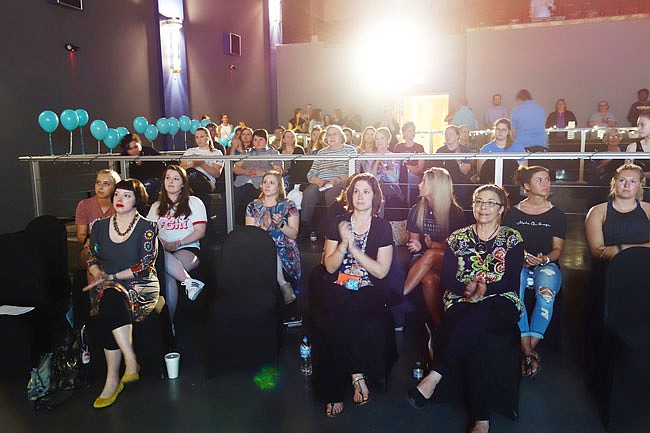It happens here.
It can happen to anyone.
If it's happened to you, you're not alone - and there are people who can help.
Those were the lessons of Tuesday's Take Back the Night rally at the Brick District Playhouse. The annual event brings awareness to domestic/intimate partner violence and sexual assault.
"As sexual assault affects one in three women and one in six men, it's likely we have survivors among us this evening," Coalition Against Rape and Domestic Violence Executive Director Tyler Rieke pointed out.
Law enforcement in Callaway County responded to 135 sexual offenses in 2018, Callaway County Sheriff Clay Chism said.
"I can only report on what's reported to us," he said. "There's a lot that law enforcement never hears about."
With two investigators focused on sexual and domestic violence, the sheriff's office puts a heavy emphasis on finding justice for victims in the county. But the process isn't easy on survivors. Deputies must ask invasive questions; survivors may undergo medical testing and face their attackers in court.
"I want to say sorry to victims that you get put through hell, but thank you for having the courage to step forward," Chism said to the audience.
Jeannie Schmidt shared how violence impacted her own life. Now a victim advocate with CARDV stationed at Westminster College, she spent 25 years being beaten down by her own family and her partners.
Schmidt's mother was the victim of domestic violence, and because Schmidt was never taught how to spot warning signs herself, she fell into several similar relationships in her youth. She first got married at age 16, escaping that marriage at 19 with six broken bones and a concussion.
"It made me the perfect prey," she said.
Schmidt met her next abuser through a mutual friend shortly after graduating college. The man was charming and persuasive. Within a week of their second date, he showed up at the house she'd recently purchased and simply moved in. He convinced her it was dangerous for her to live alone.
A few weeks later, she confronted him after catching him cheating. He beat her up, then sobbed for forgiveness, claiming her accusation had triggered his behavior. The gaslighting - lying to her about her own experiences - and violence didn't stop there.
"It takes a tough chick to make it in this family," his sisters told Schmidt.
After sabotaging her birth control, the man got her pregnant within six months. He told her he wanted her barefoot and pregnant nonstop until she was too old to bear any more children.
When Schmidt's daughter was five months old, an argument so minor she can't remember the topic blew up into the most violent attack yet.
"He was chasing me around and around and around the kitchen table," Schmidt said. "I kept looking across the kitchen at where my little baby was sitting in her carseat."
He pummeled her until she thought she might be dead, then called her mother and told her to pick up her daughter.
Schmidt and her mother talked long into the night, but by now, the man had her isolated without a car, money or an alternative place to live. She went back.
Schmidt didn't escape for years, until well after she'd become a victim advocate, when he abandoned her and their three children with no propane and no access to a bank account - right before Christmas. By then she knew who to call and how to leave. Many years later, she still struggles with the after-effects of the abuse.
"I'm relearning who I am, not who he tried to make me be," she said. "The most difficult part for any survivor is speaking what you've lived. Once you've said it, it's real."
CARDV, the sheriff's office and the prosecuting attorney's office work together to help advocates escape, seek justice and heal. In 2018 alone, CARDV aided 41 survivors of sexual assault in the county, including 81.5 hours of case management services and 89 hours of professional counseling.
CARDV provides many other services, including emergency shelter, help getting protection orders, support groups, court advocacy and more. To get help, call 573-642-4422 or visit callawaycardv.org. To learn about volunteer opportunities, visit callawaycardv.org/volunteer.

